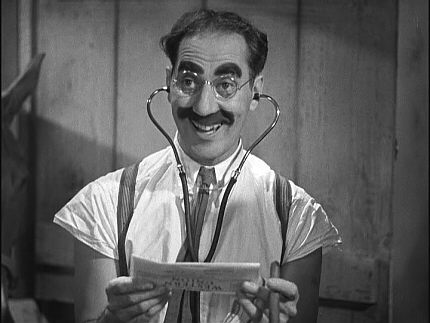I’m directing again. I enjoy directing. I’m not bad at it and the results are almost always worth the time it all took. There are, of course, occasional exceptions to this, but Dirty Work at the Crossroads and Damn Yankees will go unmentioned in these pages. (Though I will give you a full debriefing if you get enough alcohol into me – though there’s not that much alcohol in the world …)
But I digress.
I’m directing, and this time, it’s a unique experience for me because I’m directing my own script. Now, let me clarify that. It’s my script, but it’s neither original nor wholly my own. It’s an adaptation of Moliere’s The Imaginary Invalid, written in collaboration with, primarily, my long-suffering wife and, secondarily, the cast.
When I toured the theatre at the interview, I knew it was going to be a small-scale production. I could see I wasn’t going to be able to fly in chandeliers or helicopters, and my royalty budget was going to be minimal, so I started thinking of what I could do that would fit the budget and the space. That’s fine. In the last decade, I’ve become more of a minimalist, and do what I can to get by with metaphor and suggestion. I was given carte blanche on what script to select, and after some brief thought, I remembered how two of the funniest productions I’ve ever seen were of Invalid, and that it might be time for me to try some Moliere. And if I was going to do Moliere, well, why not do my own translation? I mean, there would be no royalties at all, so the script would say exactly what I’d want it to, and it could be fun. Regardless, it would push me out of a comfort zone and force my creativity into an unfamiliar direction.
Pushed out of a comfort zone, or off a cliff?
Now, I know I’m not unique in this. Playwrights do it all the time – the proprietor here is a prime example. But there’s a lot to do. It’s not as complicated as acting in a show while directing it, but it’s no walk in the park. We’re three weeks into rehearsal (and I’m already on my third ingenue. Don’t ask …), and it’s a constant battle to watch staging, add business, and course correct while simultaneously wondering if something is phrased correctly, gets the point across, advances the plot, and sounds right. And, most importantly, there’s no writer to blame if any of those script factors are lacking.
One of the things I’ve wanted to do during this process was to give the actors a literal voice; to make sure that not only are their ideas implemented, but that my deathless dialogue feel organic to them. (I can’t really call it Moliere’s deathless dialogue because A) it’s not in 17th century French, B) it’s not in rhyming Alexandrines, and C) I’m pretty sure Moliere never included references to Monty Python, the Marx Brothers, or Taylor Swift.) That’s the beauty part; even though Moliere’s point was that all doctors are quacks and frauds, and that none of them are to be trusted (which is ironic, because this is the play in which he suffered a fatal seizure while performing), we’re able to take his basic characters and situations and make them do whatever we want. (And, of course, since Moliere himself was adapting commedia archetypes and making them say and do whatever he wanted, I feel no qualms about doing that to him.) In my case, it means ribbing both “natural” medicine and hard-core evangelicals, among other targets. Given the time, and a desire to stick to the basic structure of the play, I wasn’t able to take it as far as I wanted to, but I neither wanted to really insult people nor lose the lightness of the original. It’s a dumb comedy about a rich hypochondriac who gets fleeced by con men, and that’s the story I wanted to stay with. All the rest is layering and dressing.
That whirring sound? Moliere, spinning in his grave
The thing this whole experience has pointed out to me is how back to basics it all is. It’s not quite “two planks and a passion,” but it’s not lavish. Jeebus knows that none of us do this for the money, but this is an extreme case of that. We’re taking a story and telling it in a fun and light manner. We don’t have much in the way of sets or costumes or props; we’re not skimping, but it’s not a show about the trappings. It’s a show about a company getting together, playing multiple parts, and entertaining an audience, and maybe giving them the slightest of messages to take home with them.
Dr. Hugo Z. Hackenbush. Not in Moliere's original
It’s something I’d recommend to any director. Sure, it’s a privilege to work with big budgets and be able to get anything you want, but it’s truly bracing and challenging to have limited resources and make your creativity work rather than writing a check.


No comments:
Post a Comment